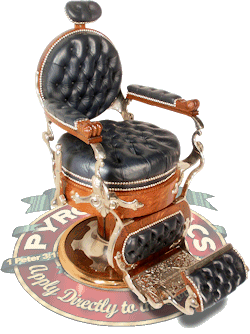by Dan Phillips
As always, I'm going to try to say as much as I can, as briefly as I can.
Man: body and soul. From the Bible I learn that man was created as an embodied soul (Gen. 1—2). He's not a spirit uneasily floating within a body; he's not a body with some higher functions. Being parted from his body is an unnatural and temporary state, which God will ultimately remedy (1 Cor. 15; Rev. 20).
In the meanwhile, here we are, body and soul. Spiritual realities such as guilt and unbelief, as well as faith and hope, produce physical effects (2 Sam. 13:2; Pss. 16:9; 32:3-4; 38:3, 7; 63:1; 119:120), and physical states can effect us spiritually (Pss. 6:2-7; 88:13?). We should humbly admit that there are many mysteries as to the relation of soul and body that we just can't resolve finally. Where is the person, in the body afflicted with
Alzheimers, or laid low in a coma? What is the volitional buy-in when there is what is called a bipolar or autistic pattern? Is it great? Is it nil? Certainty is evasive.
Depression: cause(s) and effect(s). Specifically as to depression, it isn't a single effect with a single cause. Ask David; ask Elijah; ask Jeremiah; ask Spurgeon;
ask me. It can grow from unbelief, from exhaustion, from lazy thinking, from persecution, from a dozen, a hundred other causes known and unknown.
Professor David Murray, for instance, has recently highlighted some research finding a physical indicator of depression.
Causation gnarliness. However, that said, still — which the chicken, which the egg? Plus, the very splash this story made in part relates to the paucity of such hard evidence (remember: theory, no matter how oft-repeated, is not proof) previously. When I talked to my doctor about the very serious depression I was beginning to experience some decades ago, he told me about the lack of serotonin in my brain, and wanted me to take a pill for it. It turns out that this whole model is (to say the least)
not nearly as sure a thing as it is presented.
Now, think about that. Tests determine whether I have blood pressure issues, problems with my heart, lung, brains, nerves, eyes, and on and on. Tests identify the problems, surgery or medicine can address the problems, and tests will disclose whether the conditions are improving or not. With mental issues, emotional issues, behavioral issues?
It's not as cut and dried as we're often told by the white coats.
What's depressing me right now is the certainty that, no matter how carefully I'm trying to write, I'm being misunderstood. One group of readers is saying "Aha! Exactly! All those pills and doctors are complete wastes of time! I agree with you!" Another, "I can't believe you're so heartless and ignorant as to banish suffering people back to the Dark Ages. What do you recommend? Leeches, dungeons, beatings?" Neither is a correct reading.
It's...complicated. What I am really saying is that it's complex, it's complicated, and we should proceed with cautious humility. I am saying that stridency of voice is not always an indicator of clarity of evidence. And I'm saying all that to come to this pastoral turn.
Both ways? Not so much. When I counsel people with depression, I find that many have already been to the doctor, and many are already taking medication.
There's a real imbalance in practice, here; a partnership that should be happening but isn't. If a person came to me with serious depression, I would encourage him to get some medical tests to make sure there's not a physical issue. However, I have never yet met one person whose doctor said "There are pills that address some of these symptoms. But since I find no physical cause, I'd like you first to work with your pastor and see if the issue isn't non-physical." Rather, it seems that doctors reach for their prescription-pad faster than James Bond for his Walther PPK.
 Altered picture.
Altered picture. So in these situations, I start out in a bind. I am, as I said, not opposed in principle to medication. However, it is undeniable that medication changes the equation to some degree, perhaps dramatically. I am dealing with a person who is taking mind-affecting drugs. What he sees and feels is colored, to some degree, by the pills he is taking. NOTE: Truly, I am saying this without the least condemnation of the suffering brother or sister. I simply state a fact.
Some drug is in the picture with which I'm being presented. I have no training in these medications, and have no expertise in dealing with drugs, so... what exactly do I do? How do I proceed?
Are the drugs helping this dear one and me in what we want to accomplish? Or are they hindering? Are they moving us towards a goal, or hiding critical information?
Curing... or masking? Think of it this way: suppose I'm wearing
shoes that are far too tight. My feet hurt awfully. I go to the doctor. The doctor wants to help me, he hears I'm in pain. So he prescribes pain medication. I take it, I feel better. And I continue wearing the shoes.
The pills help the pain (that the shoes are causing), but they do other things as well. I'm a bit drowsy, I'm not as sharp-minded. The drug affects my work, it makes driving problematic. And then there's the problem of the law of diminishing effects, as dosage is gradually elevated.
However, the pills were immediately helpful for the pain.
The problem of pain? or of its absence? All of this overlooks the fact that this pain had a purpose, a God-given purpose. The pain was meant to alert me to the problem: my shoes were too tight. The solution was not to address the pain
qua pain, but to find the source of the pain. In fact, helping me tolerate the pain — short-circuiting God's flashing red light system — might ultimately cause real damage to my feet.
So this depression... is it a hormonal deficiency? As a pastor, I can't help that by Biblical counseling. Lack of rest? Blood sugar? That's not my area, not my specialty.
But suppose (just suppose! that's all I'm saying) the depression is a result of guilt over sin? or of ignorance of God's truth? or of a faint grip of the truths of God's grace and love and promises? or of lazy unbelief? or of disobedience? These are among the many, many
possible causes of depression — not to mention
the causeless depression of which Spurgeon wrote. But in all of these cases except perhaps the last, not only will medicating the symptoms away
not help, but it will actually retard the process, by hooding God's flashing red light.
Where are we going? And there's more. Invariably, I ask these dear souls what the doctor's end-game is, and invariably they don't know, because he hasn't told them. Does the doctor mean them to take pills the rest of their lives? (Some have already done so for decades.) But then, how can we ever know whether the person is better? One can't stop these medications cold-turkey, that causes its own problems. So where are we going with this, and how do we know when we've gotten there?

In the attempts to bring this post to a close with a useful takeaway, here is a list of questions I'd like anyone to ask his doctor,
before he begins taking drugs for depression or such. These should not be combative questions. They aren't meant to be. They should simply help make for an informed patient.
As an added bonus, the answers would be very helpful to the pastor who usually is brought in late in the game.
Ask your doctor:
- Do you think my problem is a sheerly-physical problem?
- Is there a test that has shown, or can show, whether my problem is a sheerly-physical problem?
- How long do you intend me to take these pills? That is, when will I stop?
- How will we know when I can stop taking these pills?
Even answers to just those four questions would be so helpful in a counseling situation.
After all, I hope we're all agreed to hold three specific stances:
- Our goal in life is to glorify God to the greatest degree possible (1 Cor. 10:31).
- We don't want to try to address physical issues spiritually, or vice-versa.
- While medicine is a gift from God, we don't want to take either more or less personality-affecting medication than is necessary.






















 AUL was the very model of what a Christian minister should be. He was a watchful shepherd over the flock; he did not simply preach to them, and consider that he had done all his duty when he had delivered his message; but his eyes were always upon the Churches, marking their spiritual welfare, their growth in grace, or their declension in godliness. He was the unsleeping guardian of their spiritual welfare.
AUL was the very model of what a Christian minister should be. He was a watchful shepherd over the flock; he did not simply preach to them, and consider that he had done all his duty when he had delivered his message; but his eyes were always upon the Churches, marking their spiritual welfare, their growth in grace, or their declension in godliness. He was the unsleeping guardian of their spiritual welfare.
 by Frank Turk
by Frank Turk
 So how do we carry that over into the real world 2000 years later? Should we then embrace whatever institution has risen up – should we not have had a reformation? Should we never-ever leave the local church?
So how do we carry that over into the real world 2000 years later? Should we then embrace whatever institution has risen up – should we not have had a reformation? Should we never-ever leave the local church?
 I was having a discussion with my pastor, and I related it to my wife (who is the greatest blogger who never typed 1K of bandwidth). The discussion was about church leadership, and whether the metaphor of the shepherd was useful in a society like America where 95% of the people have never seen one sheep, let alone a flock, let alone a person who was herding sheep.
I was having a discussion with my pastor, and I related it to my wife (who is the greatest blogger who never typed 1K of bandwidth). The discussion was about church leadership, and whether the metaphor of the shepherd was useful in a society like America where 95% of the people have never seen one sheep, let alone a flock, let alone a person who was herding sheep.
 The biggest separation, however, between the good shepherd metaphor and the CEO is that the Shepherd lives with his sheep in every way. That is, the shepherd has to get dirty and do distasteful and even degrading things to make sure he takes proper care of his sheep. I don’t know a lot of CEOs who are ready to degrade themselves, for example, by working in the same conditions as the hourly single parent who has to work on the line. “But cent,” you might say, “the CEO does a pretty radically different kind of work than the hourly employee,” and I’d agree with you. Christ does a pretty radically different work than I do, but you know something: though he was in the form of God, did not count equality with God a thing to be grasped, but made himself nothing, taking the form of a servant, being born in the likeness of men. And being found in human form, he humbled himself by becoming obedient to the point of death, even death on a cross.
The biggest separation, however, between the good shepherd metaphor and the CEO is that the Shepherd lives with his sheep in every way. That is, the shepherd has to get dirty and do distasteful and even degrading things to make sure he takes proper care of his sheep. I don’t know a lot of CEOs who are ready to degrade themselves, for example, by working in the same conditions as the hourly single parent who has to work on the line. “But cent,” you might say, “the CEO does a pretty radically different kind of work than the hourly employee,” and I’d agree with you. Christ does a pretty radically different work than I do, but you know something: though he was in the form of God, did not count equality with God a thing to be grasped, but made himself nothing, taking the form of a servant, being born in the likeness of men. And being found in human form, he humbled himself by becoming obedient to the point of death, even death on a cross. ulpit Live is currently posting
ulpit Live is currently posting 
 I mentioned Driscoll by name only in two places in my message—once at the start and once at the end. The first time I mentioned him, I quoted from the opening sentence of an article in the New York Times Magazine about Driscoll. I attributed no words to Driscoll himself. The second time I singled out Driscoll by name, I referred to a joke he has told repeatedly. I made no attempt to "quote" the joke, because doing so would have violated the principle I was attempting to affirm. So I described the joke in oblique terms. Again, I attributed no words to him.
I mentioned Driscoll by name only in two places in my message—once at the start and once at the end. The first time I mentioned him, I quoted from the opening sentence of an article in the New York Times Magazine about Driscoll. I attributed no words to Driscoll himself. The second time I singled out Driscoll by name, I referred to a joke he has told repeatedly. I made no attempt to "quote" the joke, because doing so would have violated the principle I was attempting to affirm. So I described the joke in oblique terms. Again, I attributed no words to him.







 n reference to ministers, many church-members are indifferent as to the personal piety of the preacher; what they want is talent or cleverness. What the man preaches does not matter now; he must draw a crowd, or please the elite, and that is enough. Cleverness is the main thing. One would think they were looking for a conjurer rather than a pastor. Whether he preaches truth or error, the man is held in admiration so long as he can talk glibly, and keep up a reputation as a speaker.
n reference to ministers, many church-members are indifferent as to the personal piety of the preacher; what they want is talent or cleverness. What the man preaches does not matter now; he must draw a crowd, or please the elite, and that is enough. Cleverness is the main thing. One would think they were looking for a conjurer rather than a pastor. Whether he preaches truth or error, the man is held in admiration so long as he can talk glibly, and keep up a reputation as a speaker.









